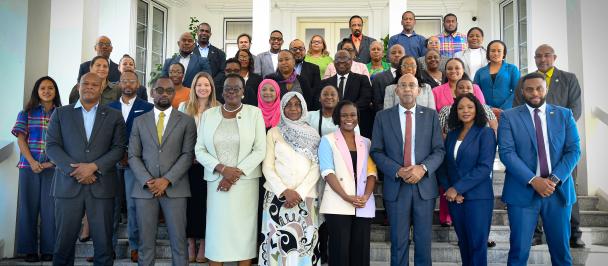Members of Dominica’s Kalinago community at the launch of the EnGenDER Project Livelihoods Assessment Workshops
One of the Caribbean’s last remaining indigenous groups is taking steps to preserve their centuries old way of life, which is currently being threatened by climate change. Dominica’s Kalinago people, with support from the island’s government, and the United Nations Development Programme (UNDP) Barbados and the Eastern Caribbean are creating more resilient communities that can better withstand climate impacts and improve their quality of life. These efforts are part of the UNDP’s Enabling Gender-Responsive Disaster Recovery, Climate and Environmental Resilience in the Caribbean (EnGenDER) Project which is funded by the governments of Canada and the United Kingdom, and seeks to ensure equal access to climate change adaptation solutions for women, children, persons living with disabilities and other vulnerable groups in the Caribbean.
Speaking via video, on Monday, 7 February 2022, during the launch of a series of workshops to assess the current needs and vulnerabilities of the Kalinago people, and how these may increase due to the effects of climate change, Valerie Cliff, Resident Representative UNDP Barbados and the Eastern Caribbean, noted that the two-week assessment and the resulting recommended actions are an essential prerequisite for inclusive growth. She stated, “The Commonwealth of Dominica has a historic opportunity to undertake transformative change and invest in development that creates a greener, healthier, and more inclusive future for the island’s most vulnerable groups, specifically the Kalinago People and Community. Achieving this requires an ambitious, coordinated, and innovative approach to climate action, one that understands development is only truly sustainable when gendered inequalities are acknowledged and addressed.”
The Hon. Cozier Frederick Minister of the Environment, Rural Modernisation and Kalinago Upliftment, Dominica, speaking at the launch of the EnGenDER Project Livelihoods Assessment Workshops
The assessments, are funded through the Offer of Complementary Funding (OCF), an EnGenDER initiative that helps Caribbean nations access a portion of USD 76 million in climate financing from international organisations like the Green Climate Fund in order to increase national mitigation and adaptation measures. Both the EnGenDER Project and the OCF are funded by the Governments of Canada and the United Kingdom. To date, eight of the nine countries participating in the EnGenDER project have accessed the OCF’s USD $715,000 fund.
EnGenDER’s OCF is directly aligned with Dominica’s vision of becoming the world’s first climate resilient state and will contribute to the overall sustainable development priorities of the Government of Dominica. The Honourable Cozier Frederick, Minister of the Environment, Rural Modernization and Kalinago Upliftment, speaking at the launch highlighted the importance of an inclusive approach to building climate resilience. “There have been numerous instances in our history where people have not been able to participate fully in the development of their country or their communities, and so this is something that we are trying to undo,” he stated adding, “This important project which is across nine countries in the Caribbean is important for us here in the Kalinago space, because one of the things we have to remember, and it’s a fact, that we are on the frontline of climate change. We do not produce all of the emissions that would cause those changes, but we get affected by it, and the most recent story that we have is Hurricane Maria. And so, it is important for people within the community, like yourselves, to participate in that movement to push forward for the first climate-resilient country.”
Speaking on the upcoming workshops, His Excellency Scott Furssedonn-Wood, British High Commissioner to Barbados and the Eastern Caribbean remarked, “This week’s activities looking at how to collect information to better understand how those climate impacts affect livelihoods in the Kalinago Territory will be used to provide recommendations for adapting livelihoods and for recovery plans to ensure that as a community you are stronger. The next step will be to use this information to enhance proposals requesting international funding which will provide support for the implementation of these livelihoods adaptation recommendations.”
Also making an address at the launch, Ms. Jennifer Heys, Head of Cooperation, Barbados and the Eastern Caribbean, Global Affairs Canada, reinforced her organisation’s commitment to Dominica mission to boost its climate resilience. “We’ve also been very pleased to support the people of Dominica and the Government of Dominica in a number of other initiatives that really place resilience at the fore, as the Government of Dominica has done with your pledge to become the world’s first climate-resilient nation. Through our sustained engagement with CREED and many other initiatives in the country, we will be with you walking hand in hand as you look to achieve that goal,” she noted adding, “The last year has proven the true extent of the multi-hazard environment we live in here in the Caribbean. The Global Covid-19 pandemic, hurricanes, volcanic eruptions, they have all collided in such a short space of time, and serve to remind us how important it is to invest in our ability to prepare, respond and then recover.”
At this time when exogenous threats like COVID-19 and natural disasters are impacting the region, it is vital that developmental efforts are continued to reinforce the need for regional resilience and building forward better. The EnGenDER Project is part of the work of UNDP Barbados and the Eastern Caribbean in its commitment to promoting economic diversification, job creation and resilience with the "Blue Economy for Green Islands" vision. As the Caribbean continues to seek solutions to support traditionally vulnerable groups, UNDP Barbados and the Eastern Caribbean, in partnership with governments and stakeholders, remains dedicated to the advancement of inclusive and sustainable development throughout the region and building resilient communities that can withstand shocks and crises through targeted projects and programmes.
***
For further information please visit: https://www.bb.undp.org/content/barbados/en/home/engender.html
For media queries please contact:
Marsha Branch: marsha.branch@undp.org

 Locations
Locations



